#human acts
Photo



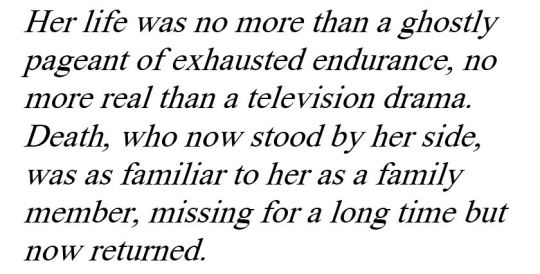
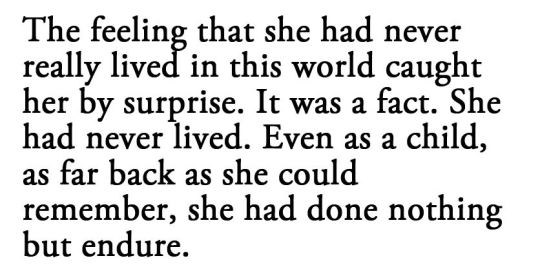


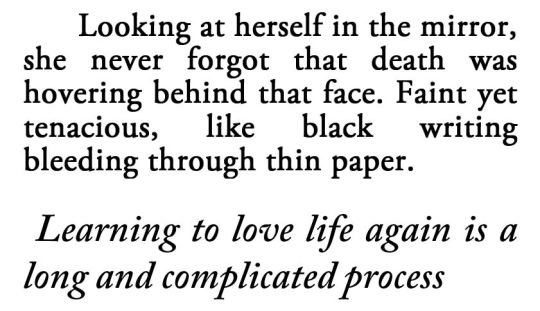

― favorite words of … han kang
the vegetarian, human acts, the white book
˗ˏˋin case you’d like to buy me a☕ˎˊ˗
#han kang#translated by deborah smith#favorite words of#quotes#literature#parallels#translated literature#korean literature#the vegetarian#human acts#the white book
2K notes
·
View notes
Note
heyy if you can find anything on it, could you please do a web weave on having gone through so much but being strong through all of it and never allowing yourself to hurt? and/or maybe being jealous of other people who are able to express their hurt when you cant


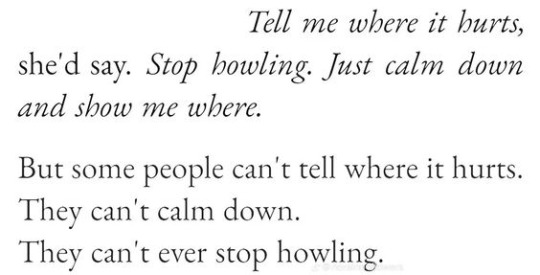



i hope you're doing okay <33
Han Kang Human Acts / Margaret Atwood / Rainer Maria Rilke (tr. Anita Barrows & Joana Macy) To the Younger Brother; The Book of Hours / Eleanor Hsieh Jenny Holzer said... / Celeste Ng Little Fires Everywhere
#this one was really hard ngl#on growing up#on resilience#on endurance#web weave#web weaving#poetry compilation#poetry parallels#han kang#human acts#margaret atwood#rainer maria rilke#to the younger brother#the book of hours#eleanor hsieh#jenny holzer said#celeste ng#little fires everywhere#spilled ink#spilled feelings#spilled thoughts#spilled poetry#spilled words#dark academia poetry#dark academia quote#dark academia#poetry#poem#words#writing
487 notes
·
View notes
Quote
Work is a guarantee of solitude. Living a solitary life, you are able to let the regular rhythm of long hours of work followed by brief rest carry you through the days, with no time to fear the outer dark beyond the circle of light.
Han Kang, Human Acts
66 notes
·
View notes
Text

― Han Kang, Human Acts
52 notes
·
View notes
Text

30 notes
·
View notes
Text

Some more Korean reads 🇰🇷📚
난 요즘 많이 좋아 😌
#the dog who dared to dream#sun mi hwang#human acts#han kang#please look after mother#kyung sook shin#almond#won pyung sohn#the plotters#un su Kim#concerning my daughter#kim hye jin#miss Kim knows#cho nam joo#korean lit#korean literature#books#reading#bookblr#bookstagram#read
27 notes
·
View notes
Text
recent reads and recommendations:
i’ve been trying to read more recently and kind of get back into a reading flow where i always have a book on the go to read when i can. as a result i have a lot of new recommendations for you all and thought i would share 💋
in order of earliest to latest reads:
her body and other parties - carmen maria machado ⭐️⭐️⭐️⭐️⭐️ (5 stars)
themes/genres - unsettling, horror, fantasy, short stories, contemporary, lgbtq+ (wlw, bisexuality), feminism, experimental
we're starting off strong with one of my new favourite authors, carmen maria machado <3 i fell in love with machado through this book. her beautiful, horrible, astonishing writing made this possibly one of my favourite books ever. i can't say i ever expected to be reading (and adoring) a 60 page list of fever-induced law and order synopses but my god it was incredible. a well-deserved five stars to kick off the list.
human acts - han kang ⭐️⭐️⭐️⭐️⭐️ (5 stars)
themes/genres - south korean history, multiple povs, dark and unsettling (tw for graphic violence and body horror), experimental, contemporary.
this book was beautiful. it takes place during and looking back on the gwangju student uprising of 1980 and uses multiple povs to recount the horrors that occurred during the uprising under the newly instated dictator and martial law. i previously read ‘the vegetarian’ by han kang (another novel i highly recommend) and adored it so picked up human acts to follow up and wow i was not disappointed. it is so poetically beautiful and so haunting, the second pov especially has really stuck with me. a hard read (in terms of content) but a great and necessary one.
things we lost in the fire - mariana enriquez ⭐️⭐️⭐️ (3.5 stars)
themes/genres - short stories, gothic horror, magical realism, latin american literature
i picked this book up after reading enriquez’ ‘the dangers of smoking in bed’ which i loved. i enjoyed this book but i think, comparatively, i enjoyed tdosib a lot more. the book is structured as multiple short stories (mostly) set in argentina from various povs (the same structure as ‘tdosib’). each story is poetic, disturbing and beautiful and enriquez’ writing really highlights a culture i knew little to nothing about previously in such a rich and stunning way. the reason i rated this one a bit lower is simply that i wasn’t as enraptured with ‘twlitf’ as i was with ‘tdosib’ and i found some of the stories less interesting. still a solid read but i would definitely recommend checking out ‘tdosib’ first.
our wives under the sea - julia armfield ⭐️⭐️⭐️⭐️ (4 stars)
themes/genres - unsettling/disturbing, lgbtq+ (wlw, bisexuality, lesbian), contemporary, two character pov, gothic, the vast open ocean (tw)
this book is heartbreaking. the sense of tension and dread really creeps up on you in this one as more gets revealed and more past horrors unfold. incredibly poetic and ambiguous, slow to start but the last few parts had me speeding through. watery, foamy, flowing and gorgeous.
milk fed - melissa broder ⭐️⭐️⭐️⭐️⭐️ (5 stars)
themes/genres - mother-daughter relationships, modern judaism, eating disorders (tw), lgbtq+ (wlw) fiction, mental health, identity
i ATE THIS BOOK UP. oh my god. broder so perfectly entangles food, love and sex, obsession and religion and winds metaphors around one another to create a novel that is so weird and yet so normal. it highlights so many societal issues and all the characters are flawed and odd in some way. the main character herself is incredibly problematic at times and somewhat of an unreliable narrator but still very lovable as you can clearly see where her issues stem from and why she is so obsessive. elements of this book really, really spoke to me as a woman who’s had my own issues with food (and mothers and food). a funny, twisted, quite dark and fascinating book that i read in about a day.
in the dream house - carmen maria machado ⭐️⭐️⭐️⭐️⭐️ (5 stars)
themes/genres - memoir, domestic abuse (tw), emotional abuse (tw), lgbtq+ (wlw, bisexuality), feminism, experimental
another cmm beauty. machado really knows how to take an unusual format and make something beautiful out of it. i'd never read a memoir before this and i'm so glad to say this was the first. genuinely like reading a memoir, a poetry anthology, a collection of short stories and a research paper all at once. beautifully done and so heartbreaking.
nightbitch - rachel yoder ⭐️⭐️⭐️⭐️⭐️ (5 stars)
themes/genres - art and the artist, fantasy/magical realism, feminism, motherhood, transformation, freedom, violence (tw for graphic animal killing), multi-level marketing schemes?
this book is mad. it is literally about a woman turning into a dog. it's brilliant. if you have recently watched barbie and want something slightly more unhinged but still on the topic of feminism and motherhood, this may be for you. i LOVE weird books and this fit me like a glove. made me think about motherhood like i never have before and the transformation throughout the book is crafted beautifully.
the priory of the orange tree - samantha shannon (currently reading)
themes/genres - high fantasy, magic, religion, dragons, lgbtq+ (wlw), romance, violence and death (tw)
i'm about 350 pages in so far guys, she's still a beast but she's a beast i love and i'll update this when i finish. as for now, don't be afraid, she may look hefty but she's WORTH IT.
hope you enjoyed this list, please send me some more recommendations, i shall gladly receive!
(p.s. i have included some trigger warnings but not an extensive list for every book, please be aware that there may be other potential triggers. does the dog die lists triggers for movies, books and tv shows and includes at least some of the books on this list. reader discretion advised!)
#not aftg#book recs#book recommendations#recent reads#her body and other parties#human acts#things we lost in the fire#milk fed#in the dream house#our wives under the sea#nightbitch#the priory of the orange tree#carmen maria machado
28 notes
·
View notes
Text
Human Acts, by Han Kang
ON GRIEF:


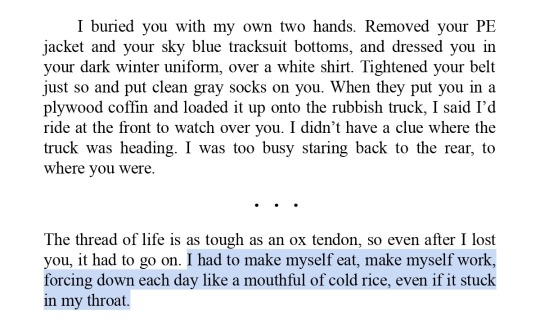
ON DEATH:



and ON HUMANITY:
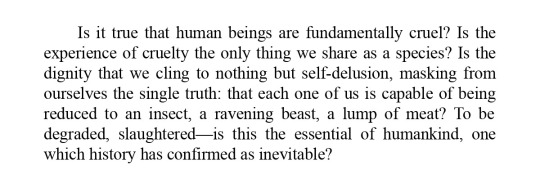
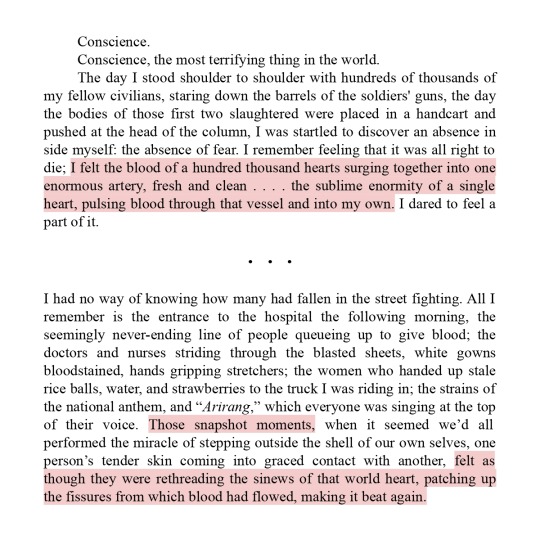

these are some of my favorite passages from Human Acts by Han Kang. There are still more but here's my favorite page as a bonus (I am sorry for the quality I just scanned my physical book ahh)
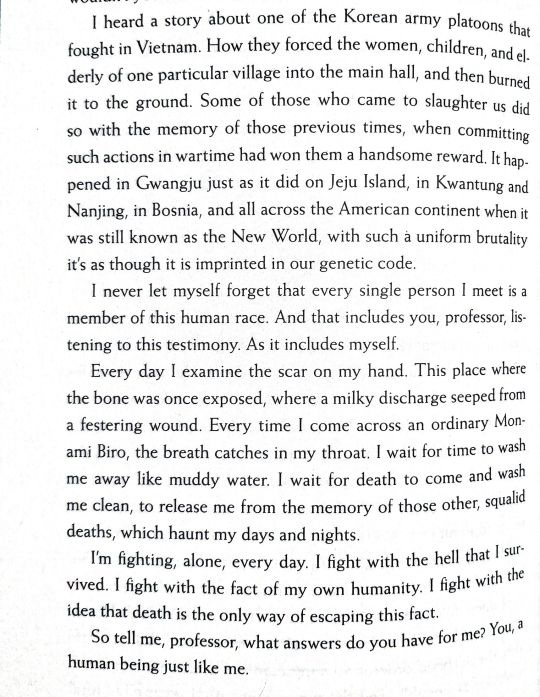
#i loveeed the writing on grief so much :(#especially the play#when you died i couldn't hold a funeral so i spent the rest of my life and every last ounce of my being grieving you.#Human Acts#Han Kang#book#literature#historical fiction#books and libraries#web weaving
50 notes
·
View notes
Text
“The feeling that she had never really lived in this world caught her by surprise. It was a fact. She had never lived. Even as a child, as far back as she could remember, she had done nothing but endure.”
— Han Kang, The Vegetarian
#han kang#the vegetarian#quotes#literature#human acts#dark academia#dark academia aesthetics#chaotic academia#chaotic academia aesthetics#light academia#romantic academia#lit#english literature#classic lit#academia#soft academia#dark academia aesthetic#reading#to read list#poet#readblr#quote#booklr#quoteblr#litblr#currently reading#text#book blog#spilled thoughts#dark aesthetic
175 notes
·
View notes
Photo
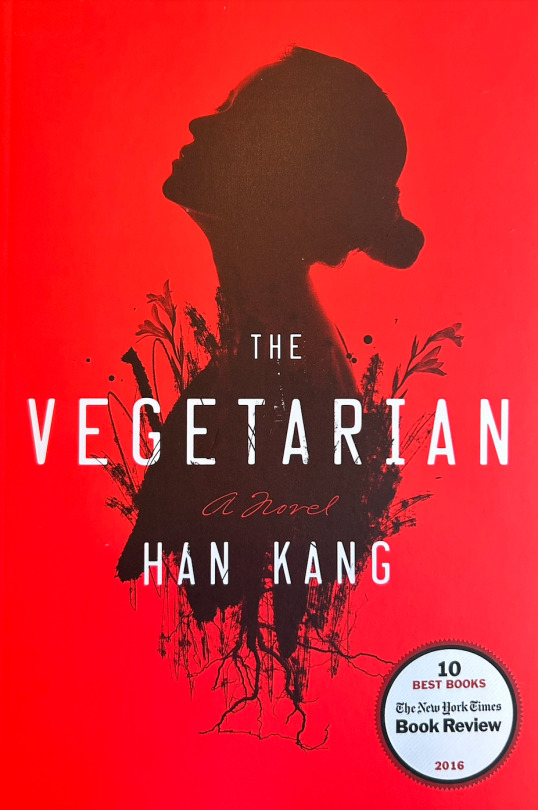
It has been far too long since I wrote one of these. I’ve gotten out of the habit. I’m also out of the habit of reading thoroughly in the way I long to, and best enjoy. It is thorough reading that lends itself to these reflective writing pieces, to tracking my thought process about a book. I have been in the habit of rushing through books for my book clubs during the busy school year. With the advent of summer break, I hope to return to that depth of reading and reflection. Let’s start with The Vegetarian.
I read this because I loved (and was disturb, challenged, and changed by) Human Acts. Han Kang has a new book out that I hope to read this summer as well. This book has much of the same dream-like thinking, gritty realism, complex psychology, and weighty symbolism that made Human Acts so compelling. Like Human Acts, the choices around narrative point of view (who tells their story and whose story gets told) feel deliberate, strategic, and powerful. This book felt a bit less mature as a novel than Human Acts, which makes sense given it’s an earlier work by Han Kang. I felt that the framework of metaphor and meaning was a bit harder to piece together here. There were more different loose threads and more questions remaining for the reader at the end of the book. I left the novel wanting just a bit more clarity, of the type that I had gotten from Human Acts.
That being stated, there was so much in this novel that was evocative and memorable, and which will stick with me—as imagery, as emotions, as concepts—over the years.
We begin with Yeong-hye’s dream. It’s the dream that moves her to stop eating meat early in the novel. The nature of this dream is revealed only in fragments, as Yeong-hye’s narrative point of view is never included (she is never given a voice, in her own story). In fragments scattered among her husband’s narration, we see parts of dreams (some of which, I later realized, draw on real memories from her childhood). This left me unsure of what Yeong-hye’s dream really was: the dog dragged in circles after her father’s motorcycle until death (later, it’s clear this is a memory)? A strange moment of cannibalism (bodies in a barn, teeth sinking into flesh)? A face in pain that repeatedly confronts her? The weight of all the dead things she has eaten settling over her heart, their bodies in her body? The dream that changes Yeong-hye could be all of these things, one of them, or none. The brutality in all these images is clear.
I deeply internalized this early explanation of Yeong-hye’s vegetarianism because it is—bizarrely, incredibly—exactly like my story. I became a vegetarian more than 13 years ago after a dream. I woke up the next day and I never ate meat again. Full stop. I have a different explanation I often give for my vegetarianism: that week, my town’s last small farm (one where my family had often volunteered our work efforts, and where we had befriended the generational farmer) went out of business. No longer able to survive as a small-scale, local operation in the face of climbing costs and competition from factory farms, the farmer went bankrupt. She needed to get rid of all her animals—about 200 sheep and 200 chickens, and 100 cattle—in 48 hours. My mom and I had helped with this, strategizing together, and my mom made phone calls to plead with people we knew to take some of these animals, so not every one would be sent to slaughter. This experience forms the backbone of my vegetarianism. Despite raising sheep and seeing other 4-H kids sending animals to slaughter, I understood that the real enemy was the factory farm operations in which animals were raised cruelly and unsustainably in order to drive down costs. I wanted to practice what I preached and one small way to do that was to not eat products I knew were coming out of the factory farming system.
This is the rational explanation I give about my conversion to vegetarianism. Even from myself, at times, I think I have hidden away the dream. The dream is what really changed me because—in the dream—I felt everything. I understood the horror of the factory farm on an emotional, not a rational, level. My dream feels hard to explain or share because words don’t adequately capture what it felt like, still so vivid in my memory all these years later. When the topic of my vegetarianism arises, I spend a lot of time not looking at my dream directly. In my dream, I was in a warm, dark space. There was the breathing of hundreds of other animals all around me. I could feel their presences and their bodies pressing in around me. I’m not sure what form my own body took, but I perceived the dream from the eye-level of the other animals. Among them, I felt a kind of individual invisibility, a kind of blended “togetherness.” But then, I suddenly understood what was coming. I saw with crystalline horror the future just in front of us, as we were being funneled out of this dark enclosure and slaughtered. Sliced at our soft throats, second jaws gapping, dangling. I could smell the blood. I could feel the deep terror in my body, like a cramping pain inside me. The certainty of death washed over me, and the need to stand in that certainty, to just anticipate it. I woke up, shocked awake.
The impossibility of adequately explaining how this dream felt to me, and how I woke up changed from it, makes the early fragmentation of The Vegetarian accessible to me. What is it to try to articulate the dream that redirected an essential thing? It’s better for us, the readers, to stay guessing a bit about what, exactly, is the dream. Anything less than this would feel cheap.
Yet, this novel, it quickly becomes clear, is not really about vegetarianism. Unlike Yeong-hye, my conversion to vegetarianism went that far and no farther. Yes, I know the people in my life responded much better than Yeong-hye’s did (in fact, all my immediate family members subsequently became vegetarians), but Yeong-hye enacts a complete disengagement with the exploitative world humans inhabit and normalize on a daily basis. What is this book really about? It’s about control, and gender. It’s about obsession, and art, and self-awareness. It’s about power, and nature, and what makes a life worth living (or ending).
The three narrators—Yeong-hye’s husband Mr. Cheong, Yeong-hye’s brother-in-law, and Yeong-hye’s sister In-hye—play out different responses, different levels of understanding, and different personal battles in the face of Yeong-hye’s increasing mental, emotional, and physical deterioration. While a key theme across the Han Kang books I’ve read is the problematic nature and impacts of the patriarchy (the violence, both physical and psychological, that men are permitted to enact on women), I felt a surprising amount of sympathy of a key male figure in this text: Yeong-hye’s brother-in-law. While Yeong-hye’s husband’s narration is repulsive in its dismissiveness of Yeong-hye’s inner life and personal experiences, and Yeong-hye’s father is revealed to be a key abuser in her childhood, Yeong-hye’s dynamic with her brother-in-law—while problematic—felt more mutually painful to me as a reader. I mention this because the brother-in-law’s narration feels like an area in the book of incredible nuance worthy of discussion. While it would be difficult to disagree about the problematic and outright morally wrong role of Yeong-hye’s husband and father, the role her brother-in-law plays is more complex. In-hye’s horror at discovering her husband and sister’s affair seems fully justified. She seems right to perceive her husband as taking advantage of her sister as her sister descends into madness. However, the brother-in-law seems to exhibit some striking similarities to Yeong-hye in a way that unites and binds them together. His obsession with the image of her Mongolian mark, and the flowers blooming on her, feels reminiscent of her obsession with the face from her dreams. An obsessive image is destroying him (his destruction includes that of his family, his role in his family, and his societal obligations). Distraught with obsession, both characters have something they want to get from the other, something they believe can be achieved by their union: relief. Viewed in this light, the brother-in-law seems as powerless in their affair as Yeong-hye does. Both are desperate, helpless, and mentally overwhelmed to the point of making choices they would not have made under normal circumstances. This feels like interesting commentary on human psychology, on the lengths we are willing to go to alleviate mental suffering, to distract or regain control of our own minds.
During this section of the novel, I wondered whether this brand of “vegetarianism” (obsession with plants, becoming plant-like oneself) could spreading from Yeong-hye to her brother-in-law. I tried to remember (and later Googled) the kind of fungus that inhabits and controls the human brain (turns out, this is only in Science Fiction…) This infectious plant theory feels like a too-literal explanation for a more figurative arc of the novel: what does it mean to consume or be consumed? What are all the different ramifications of consumption, of eating? In the third part of the novel, there is a similar expansion of Yeong-hye’s mental state to include and impact the person closest to her. In-hye’s does not understand her sister’s condition immediately or easily. She struggles to relate to her sister when she, herself, puts “making it work” and “holding things together” above all things in her life. But she comes to understand as she visits her dying sister in the mental hospitality and witnesses the cruelty of stripping Yeong-hye of her agency, of trying to force her back into life by maintaining her body, when it’s her will to live that is being squashed. As In-hye watches doctors force-fed her sister who refuses to eat, she sees the shadows of their past in which she choose stability over freedom (she chose to return herself and her sister to their abusive father, rather than run). She finally truly sees her sister’s transformation, and longing to change states and forms, the way she is “armored by the power of her own renunciation” of meat and, in this armor—like thick skin, like bark—Yeong-hye becomes incredibly plant-like (and increasingly free from her own mind/subjected to the consumption of others). The proximity of nature, the closeness of tree and woman, returns throughout this novel. Yeong-hye insists she does not need to eat, as she—like a tree—feeds from the sunlight. Her choice to not eat meat eventually becomes a choice to not eat at all, or to not eat in the way we humans understand eating…which involves consumption and eradication, rather than transformation.
There are several central images that, as I’ve mentioned, will remain with me. The death of the dog, both memory and dream, is one of these, as Han Kang is excellent at creating literal imagery with powerful metaphorical and philosophical resonance. This brutal scene immediately called to mind Achilles dragging Hector’s body around the walls of Troy, the public viciousness enacted by the victor, the visibility of brutality that is part of the process of control. It is not the same as violence conducted in secret. It is both more honest and more deeply performative. The second wave of metaphorical echo that flowed over me reading this scene was the Stations of the Cross, as Jesus carries the cross to his death and falls the first time, and falls the second time. This echo across the literary ages also highlights the brutality of humans (the acts of violence of which we are capable), but also the longing for redemption which is as fundamentally human as violence. Yeong-hye ate the dog meat. And, years later, her body seeks redemption, a kind of spiritual transformation, to purge that act of violence from the place in which it is held and remembered: the body. The physicality of Han Kang’s writing is as directly confrontational as I could imagine, and she pairs this physicality with deep moral complexity and nuance, so we are left seeking the meaning of these images that we—like Yeong-hye herself—cannot expunge from our minds.
#The Vegetarian#Han Kang#Human Acts#Vegetarianism#tw: descriptions of animal death#important reading#critiques of the patriarchy#South Korean Literature
7 notes
·
View notes
Quote
I'm fighting alone, every day. I fight with the hell that I survived. I fight with the fact of my own humanity. I fight with the idea that death is the only way of escaping this fact.
Han Kang, Human Acts
467 notes
·
View notes
Text
A Reminder That We Are Human: ‘Human Acts’ by Han Kang Review
by Isobelle Cruz [May 21, 2023]
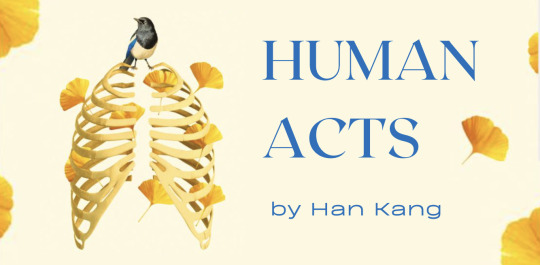
I’ve been hesitant to open up my laptop lately, afraid that I had lost it in me to write a really good article, not in terms of how many likes I receive, but on how much I enjoy the process of making it. My recent works, I admit, have felt passionless and forced for the sake of keeping my blog alive. But this is different. I devoured “Human Acts” by Han Kang over the course of one weekend—my eyes rarely drifting from its pages.
I’d never encountered an interest in the author’s works before, but once I stepped foot in the bookstore, I was suddenly drawn to its cover; simple and clean, silencing the world that surrounded me into muffled echoes.

“Gwangju Uprising” scene in Saedeuldo Sesangeul Teuneunguna at the Yeongwoo Theatre, 1988 [Image Source: Yeongwoo Mudae]
Her lips move, but no sound comes out. Yet Eun-sook knows exactly what she is saying. She recognizes the lines from the manuscript, where Mr. Seo had written them in with a pen. The manuscripts she’s typed up herself, and proofread three times.
Page 101 of Human Acts
The book features the perspectives of seven characters, one of them being an editor in 1985. Eun-sook’s chapter shows her struggle against censorship and how the company overcomes this, still able to deliver the crossed-out lines of the censors through chilling imagery. Han Kang’s writing is delivered almost in the same feels as the play tackled in her book; quiet, slow, but enough to tell the story.
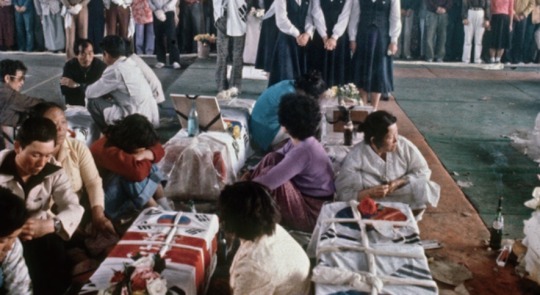
Gym turned mortuary in May 1980. [Image Source: Robin Moyer, Korea JoongAng Daily]
Another perspective that drew my attention closer than the others was of The Boy’s Friend, Jeong-dae. The words of the dead were briefly featured in the book; faceless spirits hovering over their bodies and watching as others live on, unable to do anything but watch.
If I could escape the sight of our bodies, that festering flesh now fused into a single mass, like rotting carcass of some many-legged monster. If I could sleep, truly sleep, not this flickering haze of wakefulness. If I could plunge headlong down to the floor of my pitch-dark consciousness.
Page 56 of “Human Acts”
It was depressing, and made me conscious of the body I still have control over—a blessing that I often take for granted.
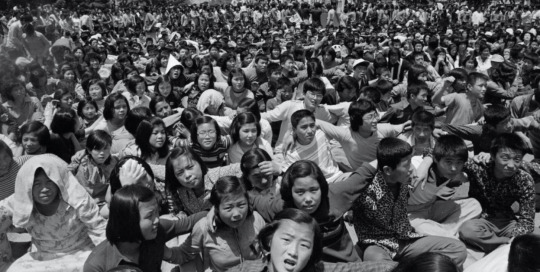
Students on the streets of Gwangju, 1980 [Image Source: Lee Chang-seong, May 18 Memorial Foundation]
Is it possible to bear witness to the fact that of a foot-long wooden ruler being repeatedly thrust into my vagina, all the way to the back wall of my uterus? To a rifle butt bludgeoning my cervix? To the fact that, when the bleeding wouldn’t stop and I had gone into shock, they had to take me to the hospital for a blood transfusion?
Page 164 of Human Acts
Human Acts is flinchingly explicit and gory. It tells the stories of victims from different angles, some of which I would forget to consider if I had not opened this book.
It disturbs me to display these photos on here, but I believe that if words are not enough to deliver chills to the blinded eyes of people, photographs will.
The kids in the photo aren’t lying side by side because their corpses were lined up like that after they were killed. It’s because they were walking in a line.
Page 133 of Human Acts
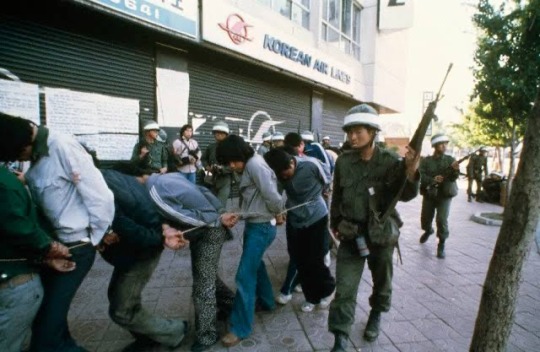
Whether you read this in the rain, or at the beach where life is supposed to be happy, a strike of pain will stay in the back of your chest, the images of agony haunting you even in bed.
Human Acts truly opened my mind much more than the other books I’ve read that spit out facts and statistics, so much so, that I am driven away from what matters most—feeling and sympathizing with the victims. Most books I’ve encountered focus solely on hating the dictator that I finish them feeling sort of empty, that I am the same person as I was when I started the book. But that is not the case with Han Kang’s third novel. It reminded me that I am human, and how much my life should be valued.
#han kang#human acts#south korean literature#korean history#asian literature#asian author#asian history#martial law#chun doo hwan#gwangju massacre#gwangju uprising#May 18
8 notes
·
View notes
Text

21 notes
·
View notes
Text
Asian Literature 📍

A full-blown college readings era—
That’s basically the story of my life at the beginning of September and currently.
Anyway, my current is the Indian Literature titled The Ministry of Utmost Happiness. This novel is basically an info heavy and highly detailed when it comes to storytelling. So far, I find it interesting, especially the cultural aspects and the psyche of the characters. I’m really looking forward to read more of this book.
My other required reading is a Korean Literature called Human Acts. I’m not entirely sure what’s this about, but I’ll share more when I get into it ✨
Side Note: my first choice for my 2nd reading is a Japan Lit since I’m quite familiar with them already however, only 2 students per country and I was quite slow on typing 🙂
With that being said, I’m still obviously excited for Human Acts ✨
Follow me on instagram ♥️
#the ministry of utmost happiness#arundhati roy#indian literature#human acts#korean literature#literary fiction#literature
2 notes
·
View notes
Text
It must have been about midnight when I felt it touch me—that breath-soft slip of incorporeal something, that faceless shadow, lacking even language, now, to give it body. I waited for a while in doubt and ignorance, of who it was, of how to communicate with it. No one had ever taught me how to address a person's soul.
Han Kang, 'Human Acts'
39 notes
·
View notes